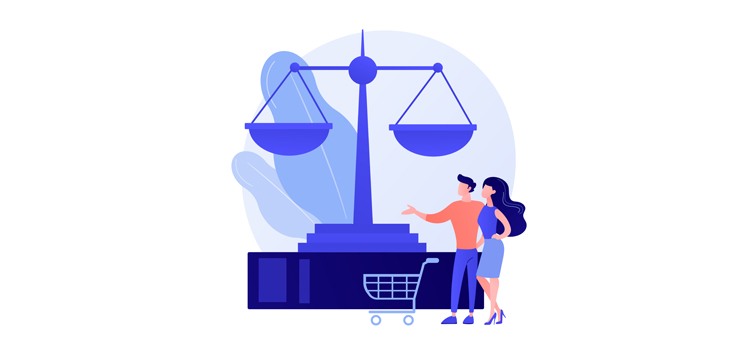Consumer Protection Lawyers
What is Consumer Protection?
We are all consumers in our day-to-day lives. We enter into several transactions in a day while being a consumer. At some point, there happen to be some goods which are not pure, services not up to the mark, extra charges for a below the mark product, etc. Sometimes, facts are concealed regarding the raw material used in a product to promote sales. In all such cases, consumer rights are being hampered because when you are paying for something, you should know what you are buying and must be served as promised in ideal terms. Consumer protection laws are introduced to safeguard all likely interests of the consumers and give them the pathway to proceed legally while protecting their rights.
Consumer Protection Laws in India
Originally introduced in 1986, the latest Consumer Protection Act, 2019 is the law in force for consumer rights. While the Sale of Goods Act, 1930 lays the principle of “Caveat Emptor”, i.e. let the buyer beware, the Consumer Protection Act founded “Caveat Venditor”, i.e. let the seller beware. It protects consumers from being deceived by requiring the manufacturers and sellers to clarify the product/ service specifications. The aim is the promotion of consumer protection which is a right of the people and the need of the economy. Establishment of consumer dispute redressal forums and consumer courts at district, state and national level through the Act directs towards a special authority dealing with consumer disputes.
Consumer Rights Lawyers in India
An idea of what consumer rights are, why they need protection and what laws lay the foundation stone for that is procured. Find the list of VidhiKarya consumer protection lawyers in India on this page. When a dispute arises, matters go ahead legally, i.e. what the law provides and whether the acts of consumers/ sellers were in confirmation with the same. Although the Consumer Protection Act, 2019 does not make it mandatory to be represented by the consumer court lawyers before the commission or forum. However, when it comes to interpreting black letters of law in professional discussions whereby my interests are at stake, it is always beneficial to have a consumer forum advocate near me. The deciding officers need clarity over what the facts are and how the concerned person’s rights are violated or not violated. In such cases, consumer court lawyers in India lay the facts and law in a systematic way before the officer. Given below are some frequent questions before consumer forum advocates.
FAQs for Consumer Court Lawyers in India
Q- What are the laws for consumer protection in India?
A- The Consumer Protection Act, 2019 is the main law that governs consumer rights in India. Other laws like Indian Contract Act, 1872, Sale of Goods Act, 1930, etc. also apply as long as the generic day-to-day norms are concerned.
Q- Do we need to hire a lawyer for consumer court?
A- As per law, it is not mandatory to have a consumer protection lawyer to represent before the consumer forum in India. A person can directly appear for self before the forum. However, having consumer court lawyers by your side can save from any confusion over legal jargon being used in the consumer courts. Since a layman may assume what he/ she faced was infringement of consumer rights, but the exact law in this context might not be the same which can be clarified through consumer court advocates.
Q- How to find expert consumer rights lawyers near me?
A- The consumer protection lawyers contact number can be obtained through friends, family or acquaintances. Below is the list of advocates for national consumer forum who also deal with district and state matters and are associated with Vidhikarya. Not every advocate might be an expert in the field of consumer protection. Thus, professional consultation with consumer protection lawyers in India might bring some clarity in this regard.
Q- What is consumer court lawyer fees?
A- The amount of fees charged by consumer court advocates might be different at district, state and national levels. It may also vary depending upon the expertise which a consumer protection lawyer holds and the facts of the case, i.e. whether the case facts revolve in favour or against the party concerned. That is why prior discussion over consumer court lawyer fees is recommended beforehand.
Search Result : Expert Consumer protection Lawyers
Consult Expert Consumer protection Lawyers in India
Advocate Abhimanyu Shandilya
Advocate Anik
Bangalore
Advocate Anish Palkar
Mumbai suburban
Advocate Prabhakara S K Shetty
Bangalore
Advocate Shrikrushna Tambde
Nagpur
Advocate Girraj Prasad
Jaipur
Advocate Karunasish Chakraborty
Kolkata
Advocate Surbhi Sharma
Delhi






















